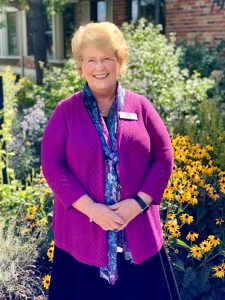WELLINGTON COUNTY – Klara and Oscar Bookbinder of Rockwood spent their final moments at Hospice Wellington, leaving behind a $250,000 estate gift to the hospice for rural support and programming.
In 2018, a Rural Wellington Health Advisory Table community health needs assessment discovered a need for palliative support and grief programming.
Hospice Wellington executive director Pat Stuart has long held a vision for expanding hospice services into the county’s rural reaches to meet that need.
“But I didn’t have the money to go with the vision,” Stuart said by phone recently.
With the Bookbinder’s hearty gift, that vision is beginning to sharpen and Stuart is trying her utmost to transcend geography and deliver support to palliative patients, their caregivers and grieving loved ones in more northern areas such as Mount Forest.
“There’s a lot of people out there that have nobody; they don’t know where to turn,” Stuart said.
The hospice facility has tried to adapt its Guelph-based programming for the county with limited success.
“Sometimes what is helpful in the city is not as helpful in the rural area,” said Stuart, a self-described out-of-the-box thinker.
“If one thing doesn’t work, we’re going to try something else.”

Hospice Wellington executive director Pat Stuart. (Submitted photo)
Julie Martin-Jansen, an advocate resource counsellor, has since embarked on a mission spreading word about the rural community programs, visiting church groups and presenting before municipal councils and committees.
People in rural areas, Stuart said, have to commute farther to access supports than those in Guelph might.
As it is, starting out from Mount Forest to get to Guelph is a long journey, to say nothing of the added stresses of winter storms.
Rural communities also tend to have more of a sense of place about them – a belonging and ownership keeping people closer to home, especially when it comes to someone’s final days.
“I think that there’s more opportunities for support groups, a caregiver group, that can take care of that person,” Stuart said of palliative patients and their loved ones in rural areas.
“How do we support the people, the families and the friends, and the church members? How do we support them to build a circle of care around a person?”
The “circle of care,” after all, is central to the model of integrated patient care Stuart endorses.
“We take that patient on and we wrap ourselves around that patient and take care of them,” Stuart explained.
Instead of a typical eight-week commitment to the hospice’s bereavement group, they’re trialling one-off workshops as a soft introduction to weighty topics strangely foreign to most, but inevitable for all.
“Once people are there and they see what we have to offer I think that will be easier for them,” Stuart said.
Workshops focus on advanced care planning, grief and education support, and navigating end-of-life planning and supports.
Caregiver coffee conversations offered in Erin and Harriston focus on the draining and demanding role caregivers provide as they move through a complicated journey alongside a dying loved one.
There’s also a “mourning” walking group at Marden Park in Guelph/Eramosa.
And if groups are daunting, one of 200 trained hospice volunteers are ready to provide in-person, one-on-one support to both palliative persons and caregivers.
“Really sometimes people just need someone to listen to them,” Stuart said.

Music therapist Katherine Manning. (Photo submitted)
A new book club is also being offered (I don’t know what to say: How to help and support someone who is dying by Dr. Robert Buckman) hoping to respond to the question of: what do I say to someone that’s dying?
Volunteers will also drive out to provide some hospice programming such as reiki and therapeutic touch upon request — all at no cost.
Stuart said the Bookbinders were musically inclined and she felt she needed to honour them.
Music therapist Katherine Manning began visiting the county once per week in April and is currently available by request.
“We’ve had her connect with a whole family that was in China and they all got to sing together,” Stuart said.
Manning has also written songs about loved ones who’ve passed.
“They would be thrilled to know that people are being offered music,” Stuart said.
The Bookbinder’s money will carry rural programming for around three years before another influx of cash will be needed to keep the music flowing.
Ultimately Stuart wants people to feel and be supported, educated and prepared for the end of life journey.
“We just want to try to help you,” she said.
A comprehensive list of services being offered this spring is available below.
The hospice also offers an approachable and easy-to-use 44 page end-of-life planning and support guidebook, created with some of the Bookbinder’s gift.
It can be found and downloaded for free in PDF format at: hospicewellington.org.
hw-at-a-glance-spring-2022



